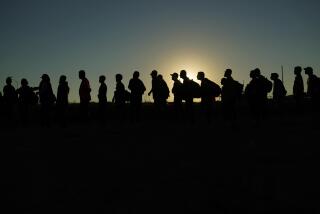Conscience on trial
- Share via
While Americans were watching fireworks on the Fourth of July, a Canadian federal judge fired off a legal Roman candle by ruling that an immigration panel had erred in denying refugee status to a U.S. Army deserter named Joshua Key. The sparks are still flying Up There, though, as usual, most Americans haven’t taken note. They should. The judge ruled that Key may be entitled to asylum in Canada because of evidence that the U.S. may have violated the Geneva Convention in the conduct of its counter-terrorism operations in Iraq.
Because of the sympathetic reception that Canada gave U.S. conscientious objectors and deserters during the Vietnam War, Americans may assume that our gentle northern neighbor will grant refuge to the perhaps 200 Iraq war deserters who have fled to Canada and thus spare us the agony of prosecuting them. But times and Canadian laws have changed. Although Canada declined to help the U.S. invade Iraq and its public largely opposes the continuing U.S. operations there, its courts have consistently ruled that U.S. deserters have no right to asylum. The courts have sensibly concluded that Americans who volunteer for military service cannot claim to be conscientious objectors merely because they oppose the war in Iraq, and that soldiers who wish to challenge the conduct of the war can do so through established legal procedures at home without fear of persecution.
In June, a more lenient Parliament passed a resolution saying the U.S. war resisters should be allowed to stay. But that resolution was nonbinding, and the Conservative government led by Prime Minister Stephen Harper, a Bush administration ally, has announced that it will begin deporting the deserters as early as this week.
Key won’t be among them. He was trained as a combat engineer and spent eight months in Iraq kicking down doors in house-to-house searches for terrorists. He says that he fled to Canada with his wife and children after he told a military lawyer his qualms about what he believed were human rights abuses by U.S. forces, and that he was told his choices were to return to Iraq or go to prison. The judge ruled that Key need not have witnessed war crimes to qualify for asylum. Rather, “officially condoned military misconduct falling well short of a war crime may support a claim to refugee protection.”
Antiwar Canadians hailed the decision, but others were outraged, saying that such a low standard of military misconduct could be used to excuse desertion or cowardice by the Canadian soldiers in Afghanistan -- or by anyone else fighting the war against terrorists anywhere. The Canadian government is considered likely to appeal.
Of course, Canada has the sovereign right to grant refugee status to anyone it pleases, but do its judges have the right to decide whether the U.S. is breaching the Geneva Convention? Actually, they must consider such evidence to give would-be refugees a fair hearing -- just as U.S. judges do when considering similar claims by those fleeing foreign military service. But they do not have jurisdiction to rule on the legality of the U.S. conduct of the war. Nor could the U.S. be sued in The Hague because it has not joined the International Criminal Court. In reality, the U.S. answers only to itself.
That is why we should take a second look at our procedures for dealing with soldiers who allege human rights violations -- before they become deserters. Whether they volunteer or are drafted, soldiers forfeit the right to act on their personal beliefs about the righteousness of the war they are ordered to fight. But any U.S. soldier who alleges that civilians or prisoners are being mistreated -- whether or not that mistreatment rises to the level of a war crime -- must be given a hearing. The evidence suggests that Key and other deserters never got one.
It’s not enough to say that a soldier should refuse to obey an order he believes is illegal (and in doing so perhaps endanger his unit and his mission), and then accept court-martial, before his allegations of improper wartime conduct can be heard. That would have been Key’s only remedy. As the Canadian judge noted, access to legal protections “must be actually available and not illusory.”
War is hell, and waging it according to the rules of common decency is hellishly difficult. But if we would prefer not to hear shameful allegations from our own deserters and be judged by our neighbors, we cannot lightly dismiss expressions of moral outrage from those who fight for us all.
More to Read
Sign up for Essential California
The most important California stories and recommendations in your inbox every morning.
You may occasionally receive promotional content from the Los Angeles Times.










